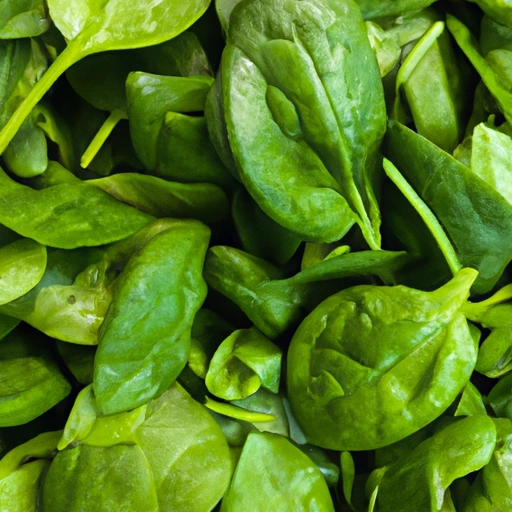Spinach
Description

Spinach, a leafy green vegetable, is renowned for its nutritional value and versatility in the kitchen. Packed with vitamins and minerals, spinach can be consumed raw or cooked and is a staple in a variety of cuisines globally. Whether you're using ounces, grams, cups, or handfuls, incorporating spinach into your meals is a healthy choice.
Common uses
Spinach is a common ingredient in salads, soups, pastas, dips, and as a nutritious addition to smoothies. It is also used as a filling in omelets, quiches, and sandwiches. Due to its mild flavor, it pairs well with a variety of ingredients and can be included in many dishes to boost their nutritional content.
Nutritional value
Calories
One cup (30g or about 1 ounce) of raw spinach contains approximately 7 calories (29 kilojoules).
Protein
Spinach provides about 0.86 grams of protein per cup (30g or about 1 ounce).
Fat
This leafy green is exceptionally low in fat, with one cup (30g or about 1 ounce) containing just 0.12 grams.
Carbohydrates
Spinach contains about 1.09 grams of carbohydrates per cup (30g or about 1 ounce), including dietary fiber.
Vitamins
Spinach is rich in vitamins, including vitamin A, vitamin C, vitamin K1, and several B vitamins.
Minerals
The vegetable is also a good source of minerals such as iron, calcium, magnesium, and potassium.
Health benefits
Spinach is associated with numerous health benefits, including improved eye health, reduced oxidative stress, lower blood pressure levels, and enhanced cancer prevention. The high levels of vitamins and minerals support overall well-being.
Potential risks
Spinach contains oxalates, which can lead to kidney stones in predisposed individuals. It's also high in vitamin K1, which can interact with blood-thinning medications. Those with kidney issues or on certain medications should consult with a healthcare provider before adding significant amounts of spinach to their diet.
Common recipes
Spinach is used in a myriad of recipes such as spinach and cheese stuffed pasta, creamed spinach, spinach salads, and palak paneer (an Indian dish).
Cooking methods
Spinach can be steamed, sautéed, boiled, or eaten raw. It is often blanched or incorporated into hot dishes, which causes it to wilt and reduce in size.
Pairing with other ingredients
Spinach pairs well with dairy products like feta and goat cheese, nuts like almonds and pine nuts, fruits such as strawberries and apples, and proteins including eggs, chicken, and beef.
Summary
Spinach is a nutrient-dense vegetable that can be enjoyed in a multitude of dishes. It's known for its low calorie count and high concentrations of vitamins and minerals. While it offers many health benefits, those with certain conditions should be mindful of its potential risks. Spinach's adaptable nature in cooking makes it a favorite ingredient in both traditional and innovative recipes around the world.